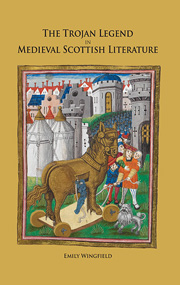Book contents
- Frontmatter
- Dedication
- Contents
- Illustration
- Acknowledgements
- Abbreviations
- Introduction
- 1 Troy in the Older Scots Historical Tradition
- 2 Troy in the Older Scots Romance and Nine Worthies Tradition
- 3 The Scottish Troy Book
- 4 Chaucer's Troilus and Criseyde and Henryson's Testament of cresseid
- 5 Gavin Douglas' Eneados
- Conclusion
- Appendix
- Bibliography
- Index
1 - Troy in the Older Scots Historical Tradition
Published online by Cambridge University Press: 05 March 2014
- Frontmatter
- Dedication
- Contents
- Illustration
- Acknowledgements
- Abbreviations
- Introduction
- 1 Troy in the Older Scots Historical Tradition
- 2 Troy in the Older Scots Romance and Nine Worthies Tradition
- 3 The Scottish Troy Book
- 4 Chaucer's Troilus and Criseyde and Henryson's Testament of cresseid
- 5 Gavin Douglas' Eneados
- Conclusion
- Appendix
- Bibliography
- Index
Summary
The Anglo-Scots Wars of Independence and concomitant ‘War of Historiography’, discussed in the Introduction, gave rise in late fourteenth-century and early fifteenth-century Scotland to texts, both historiographical and literary, which simultaneously reflected and developed emerging and increasingly explicit sentiments of Scottish nationality. Chapter 2 will consider the most well known of these texts, Barbour's Bruce, together with a series of other fifteenth-century texts in the Older Scots Romance tradition. But I begin by examining the representation of the Trojan legend and the alternative Scottish origin myth in the following Scottish historical texts: John of Fordun's Chronica Gentis Scotorum, compiled between 1384 and 1387; Walter Bower's Scotichronicon (c. 1441–47); Andrew of Wyntoun's Original Chronicle (c. 1408–20) (NIMEV 399); and two short chronicles – the Brevis Chronica and Chronicle of Scotland in a Part – most probably composed in the last third of the fifteenth century. I will analyse the representation of the Trojan legend and competing Scottish origin myth in each text in turn, assessing the impact of the historical context within which they were composed and the way in which the representation of each legend changed over time. Detailed attention is paid to the way in which the different texts both co-opt and revise Geoffrey of Monmouth's Historia, particularly in their presentation of the Greek prince, Gaythelos, who is established as a counterpart to Geoffrey's Brutus.
- Type
- Chapter
- Information
- The Trojan Legend in Medieval Scottish Literature , pp. 22 - 51Publisher: Boydell & BrewerPrint publication year: 2014



